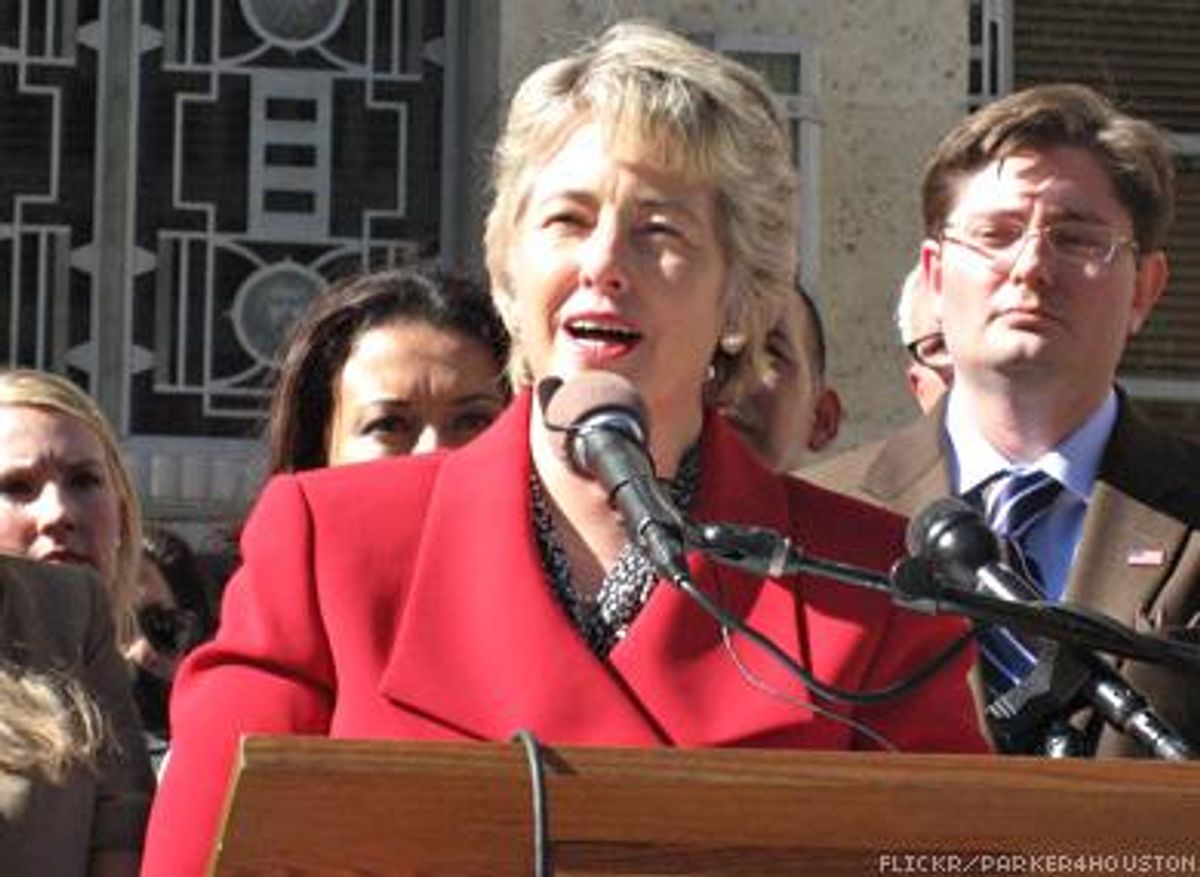Election
Annise Parker The New Face of Houston

By continuing to use our site, you agree to our Private Policy and Terms of Use.

"IS THIS THE IMAGE HOUSTON WANTS TO PORTRAY?"
The question, printed in all-caps hysteria for a November antigay political mailer, accompanied a photograph of Houston city controller Annise Parker taking the oath of office with her partner, Kathy Hubbard, at her side. It was a last-ditch attempt by opponents to deflate Parker's historic mayoral candidacy in the nation's fourth-largest city -- one that has opposed past gay rights ordinances.
But for Houstonians who elected Parker over the weekend, the answer is, "You're damn right it is."
"Tonight the voters of Houston have opened the door to history," Parker said in a Saturday night speech after defeating former Houston city attorney Gene Locke (her partner was again by her side, as were the couple's two children). "I acknowledge that. I embrace that. I know what this win means to many of us who never thought we could achieve high office."
In a post-election interview with Advocate.com, Mayor-elect Parker discusses gay activism, dirty campaign tricks, and her responsibility to the LGBT community -- both in Houston and on the national stage.
Advocate.com: Congratulations on your hard-won victory.
Annise Parker: Thank you very much. I certainly haven't had a lot of sleep.
You've asserted that while you are now seen as a national LGBT role model, you've also been a local gay rights role model for 30 years.
Yes, I was a founding member of [an LGBT] student support group in 1979 at Rice University. I've been a state cochair of the LGBT Democrats, and I've worked with the Houston GLBT Political Caucus. In the 80s I was arguably one of the most visible gay activists in Houston.
How have city politics changed since then?
It was a different time. Both [Houston city council member] Sue Lovell and I had similar experiences as past presidents of gay political organizations. We had death threats. Our tires were slashed; I was spit at by crazy people. There was always an element of anxiety.
The world has changed, even with this late attack in the runoff campaign. But I was out when I ran 12 years ago for city council ... I owed it to the LGBT community to be up-front, and my life is an open book. And I really think the voters of Houston responded to that when the antigay attacks came. I was the person they've known for 12 years, and they've appreciated that my campaign is all about Houston's [financial situation] and about providing basic services.
Even back in the '80s I was debating Steven Hotze, the man who sent out one of the antigay mail pieces late in the campaign. As I've said, I've moved on. He obviously has not.
Were you surprised by the antigay campaign against you?
No, it wasn't a surprise. Dr. Hotze was involved against the referendum [to grant benefits for same-sex partners of Houston city employees]. We had wondered when it would come. There were three pieces of mail that went out, one by Dr. Hotze. But we were surprised that highly placed individuals in my opponent's campaign were funding it. And I think Houstonians were embarrassed by it.
National groups like the Gay and Lesbian Victory Fund supported your campaign, and your success is certainly one of the year's high points in gay politics. Will you take a national role in the LGBT community?
I pledged to the voters that I would not take on any national issues that did not affect the city of Houston. I appreciate the support of the Victory Fund and other organizations, and I will do anything I can to boost the fortunes of Victory candidates and to help raise the number of LGBT-elected officials. But I will do that as a private citizen.
You've railed against the perception that Houston is an intolerant city.
Yes, I think the rest of America views us as this conservative, Southern city. But we are a diverse, international city that is very open and welcoming. There are lots of things to do here, and if you're focused on the bottom line and you want to do business with the world -- Houston is the most diverse city outside of New York. Our focus has been on international business for a long time.
Viral post saying Republicans 'have two daddies now' has MAGA hot and bothered